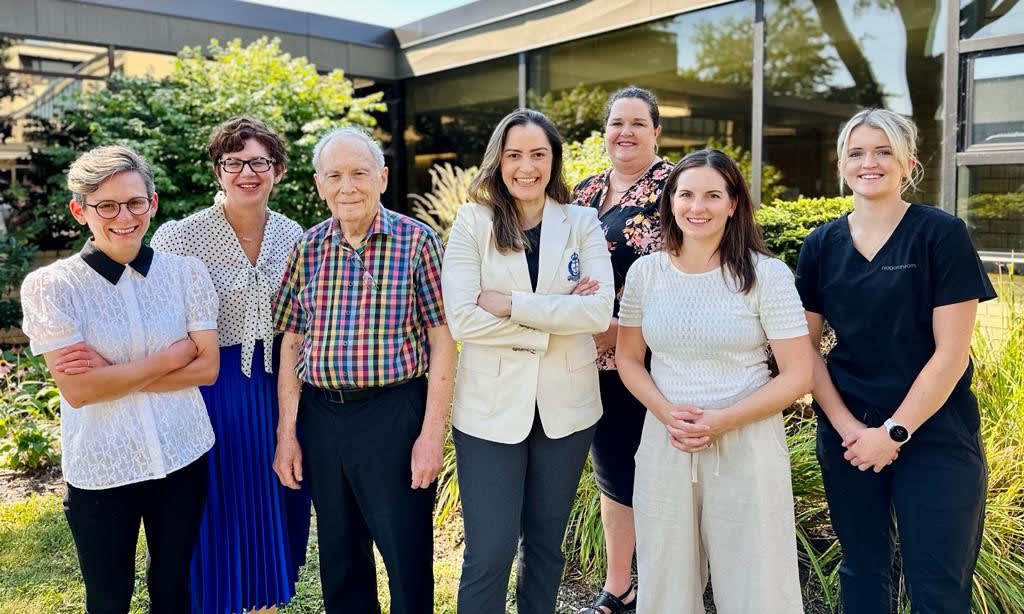The research we conduct at Niagara Health has a profound impact on the health and well-being of our patients and communities, and contributes to better understanding some of the most significant healthcare challenges of our time and have the potential to benefit patients in Niagara and across Canada.

Niagara Health's Neurology research team members are (from left): Elaina Orlando, Research Manager, Charmaine Martin, Nurse Practitioner, Dr. Donald Chew, Neurologist, Dr. Danielle De Sa Boasquevisque, Neurologist, Leanne Kent, Stroke Program Manager, Dr. Alicia Mattia, Neurologist, and Kailee Morrison, Research Co-ordinator.
Niagara Health (NH) is participating in two new clinical trials focused on stroke research, thanks to funding from the Accelerating Clinical Trials (ACT) Canada.
Every five minutes someone in Canada has a stroke, according to the Heart and Stroke Foundation. It can happen at any age and is a leading cause of adult disability. Women are disproportionately affected by stroke, with 45 per cent more Canadian women dying of the affliction than men.
The ACT Canada Consortium selected NH to receive $300,000 in grant funding for clinical research.
“The ACT funding will help us realize our goal of expanding research capacity at Niagara Health,” says Dr. Jennifer Tsang, Executive Director and Chief Scientist of the Niagara Health Knowledge Institute. “We are joining the global movement within the scientific community to be a site for many different clinical trials, spanning many different clinical areas.”
Niagara Health joins 17 other countries in a neurology study focused on stroke prevention, involving 1,200 participants. The objective of the Edoxaban for Intra-Cranial Hemorrhage Survivors with Atrial Fibrillation (ENRICH-AF) study is to evaluate whether the drug Edoxaban is superior to standard medical therapy in preventing strokes among high-risk patients with an irregular heart beat and previous bleeding in the brain.
“We just randomized two patients in our first neurology study at the Niagara Falls Site last month,” says Dr. Danielle de Sa Boasquevisque, who is spearheading the Niagara Falls clinical study.
Dr. de Sa Boasquevisque is an Assistant Professor in the McMaster Department of Medicine, Division of Neurology; Stroke Neurologist and Physician Lead of Neurology Research Program at Niagara Health. She is also the Principal investigator for Niagara Health.
“This is about team work and contribution to answer the important question of whether a patient with atrial fibrillation should be using a blood thinner, such as aspirin, or if they should be using an anticoagulant, which is a strong blood thinner, such as Edoxaban,” she says.
Recruitment of patients to participate in the Enrich-AF clinical trial is more than half-way completed across the globe, with NH joining the global team in September 2023 and recruiting two of the 781 patients globally by December 2023. The study goal is to recruit a total of 1,200 patients around the world. Niagara Health Knowledge Institute is actively seeking patients with brain bleeding and a specific cardiac arrhythmia called atrial fibrillation who are interested in joining the study.
“This isn't just about the fact that we're doing some really innovative clinical trials. This is a perfect opportunity to lay the foundation of research that will carry over to the Stroke Centre of Excellence at the new South Niagara Hospital when it’s completed.”
Meanwhile, Dr. de Sa Boasquevisque is also in the process of setting up NH for a second stroke study, the Librexia STROKE trial. This study will enroll patients with recent ischemic stroke, which occurs when blood flow to the brain is blocked.
“The purpose of this study is to evaluate whether the drug Milvexian, which is a new anticoagulant agent, in addition to standard of care, is safe and reduces the risk of recurrent ischemic stroke,” explains Dr. de Sa Boasquevisque. “This new treatment will be compared to the current standard of care treatment, which is usually one or two blood thinners in combination.”
Once someone experiences an ischemic stroke, they become more likely to experience a second stroke, especially within the first year, “with the higher risk occurring during the first month,” says Dr. de Sa Boasquevisque.
“Despite major advances in cardiovascular and stroke treatment over the past two decades, millions of patients currently remain untreated or undertreated due to the risk of bleeding, but for whom thrombotic events (when blood clots block blood vessels or the heart) could be prevented,” says Robert Harrington, M.D., Librexia program chair and Arthur L. Bloomfield professor of medicine and chair of the Department of Medicine, Stanford University.
The two new clinical research trials increase community hospital-based research in Niagara, which Dr. Tsang says is significant to healthcare equity and advancing health service delivery.
“The implications of joining the study are huge for Niagara Health,” Dr. Tsang says. “Studies have shown that hospitals that do research have better health outcomes for patients and stronger staff recruitment.”
There is also potential for the clinical research trials to lead to standards of practice within the Niagara Health system that can be shared and duplicated across other community hospitals in Ontario.
“We could conceivably come up with some really great strategies to share across all of Ontario through the Central South Stroke Network,” says Leanne Kent, Manager of Niagara Health’s District Stroke Program.
“This isn't just about the fact that we're doing some really innovative clinical trials,” she says. “This is a perfect opportunity to lay the foundation of research that will carry over to the Stroke Centre of Excellence at the new South Niagara Hospital when it’s completed.”
Dr. de Sa Boasquevisque says she felt supported in the community through the Niagara Health Knowledge Institute to get neurology research off the ground. Now, she and Dr. Alicia Mattia, Chief of Neurology at NH, have partnered with colleagues from other areas, such as Hematology and Cardiology.
As a result, three more stroke-related trials are undergoing ethics approvals, or are in the process of negotiation, with an aim to start within the first three months of 2024.

